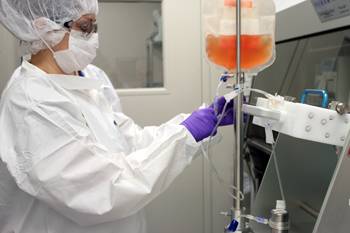Texas State alumna helps develop personalized T-cell therapy for MS patients
By Kristina Kenney
University News Service
December 4, 2012
|
Texas State Clinical Laboratory Science alumna Erin Walker conducts personalized T-cell therapy research at Opexa. |
Texas State University Clinical Laboratory Science alumna Erin Walker has been directly involved in the development of a first-ever personalized T-cell therapy for Multiple Sclerosis (MS) patients through her work with Opexa Therapeutics Inc., a publicly traded biotechnology company based in the Woodlands.
This new development in cell therapy has received Fast Track designation from the United States Food and Drug Administration for the treatment of Secondary Progressive Multiple Sclerosis (SPMS).
“Going through the program at Texas State and having a few years of general laboratory experience has greatly added to my ability to cross over into the cell therapy world,” Walker said. “It has given me problem-solving skills in the lab environment, taught me the importance of quality control and quality assurance and has given me a well-rounded understanding of the processes and their importance.”
The cell therapy contains myelin reactive T-cells (MRTCs) that are primed and expanded with three different proteins expressed on their surface. The cells, responsible for destroying the myelin sheath in MS patients, are extracted from the patient, expanded by Opexa, irradiated in order to neutralize them and then re-injected into the patient.
In September, Opexa began a trial of Tcelna (formerly Tovaxin) to treat SPMS. The company plans to enroll 180 patients in the trial, with a primary endpoint of brain atrophy as measured by the percent of brain volume change at two years.
Walker’s role in the process begins when the patient’s blood sample is received.
“I process the blood in order to extract the specific cells that are needed,” Walker said. “Once the patient’s specific cells are collected and washed, they are then taken into culture, fed with nutrients and the patient specific peptides and expanded over a number of days through the culture process.”
The cells are then taken out of the culture process and frozen in liquid nitrogen until the patient is ready for injection. This role requires Walker to work in a cGMP facility with full gowning and in an aseptic environment.
Walker graduated from Texas State in 2009 with a Clinical Laboratory Science degree from the College of Health Professions. Her former teacher, Associate Professor and Associate Dean for Research Rodney Rohde, expressed that Walker was an outstanding student and leader within the CLS program.
“Erin was instrumental in helping to develop our CLS Student Society, and she was elected as the Texas Student Forum Chair (Texas Association for Clinical Laboratory Science, TACLS), which represents all Texas CLS students and acts as a liaison with the national organization,” Rohde said.
Walker continues to be involved with the state and national organization, being awarded several designations and recognitions for her service.
“We believe our students, like Erin, are our best ambassadors for both the profession and for our program at Texas State,” Rohde said. “We couldn’t be more proud of Erin.”
